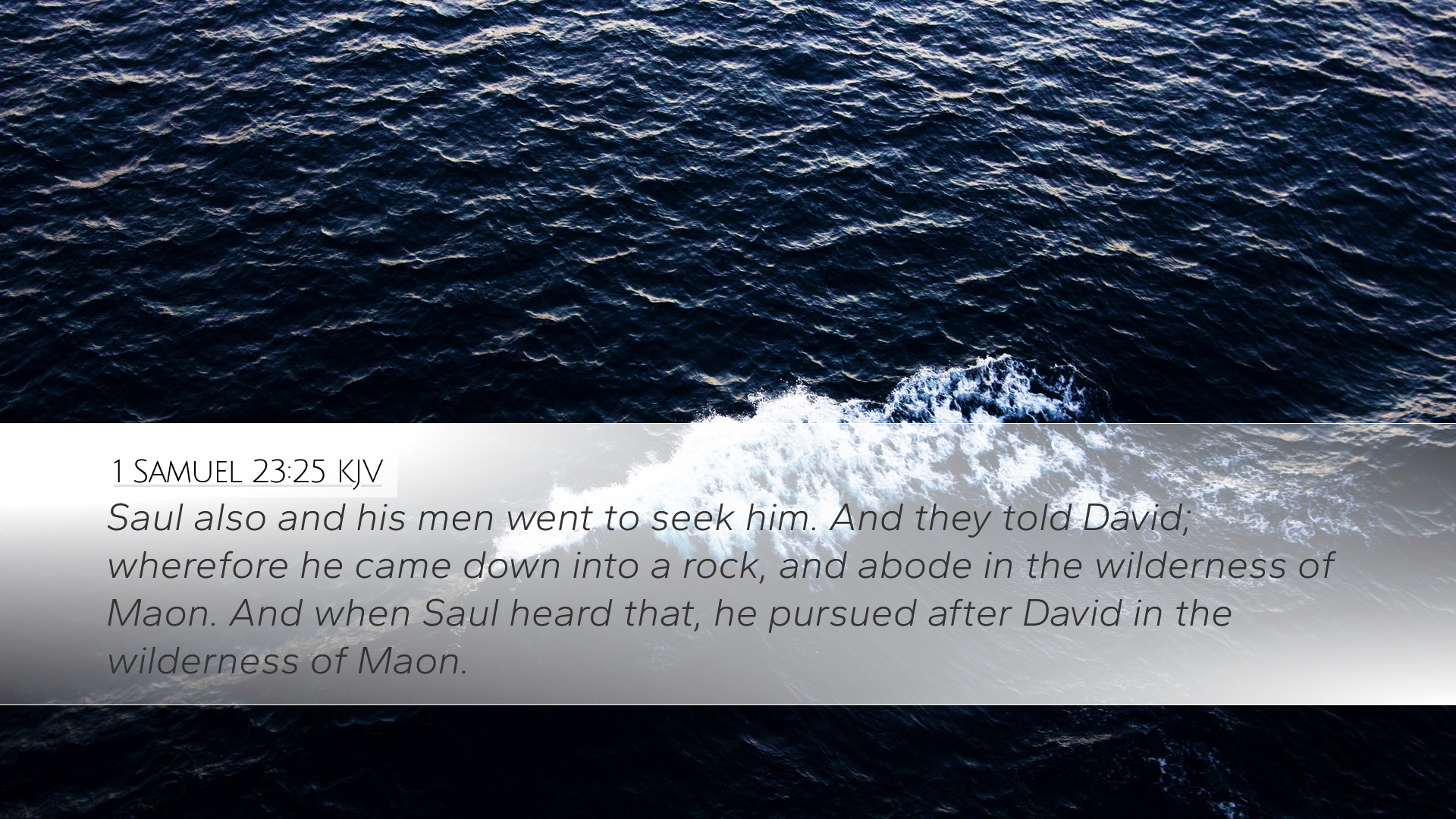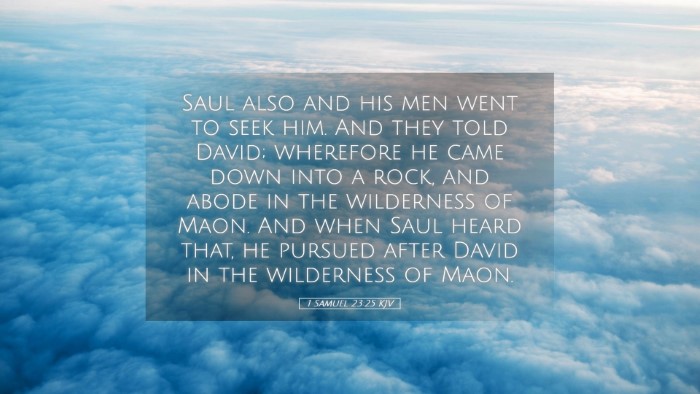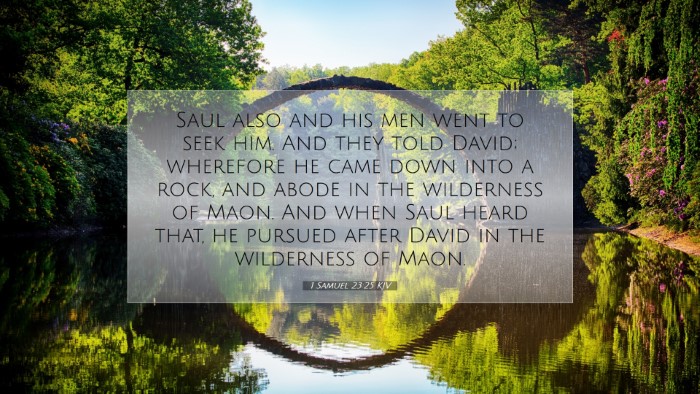Commentary on 1 Samuel 23:25
The verse in question reads: “Saul also and his men went to seek him. And they told David: Wherefore he came down into a rock, and abode in the wilderness of Maon.” This passage occurs within the broader narrative of David's fugitive period, detailing the relentless pursuit by King Saul and the implications of divine providence and human agency in David's life. Several renowned public domain commentators offer insights into this critical moment.
Contextual Analysis
David has been anointed king, yet he finds himself constantly on the run from Saul, who feels threatened by David's rising popularity and divine favor. This verse places David in Maon, underscoring his precarious situation and the tension between divine promise and human reality.
Matthew Henry's Insights
According to Matthew Henry, this episode illustrates the dire circumstances under which David operated while being pursued by Saul. Henry emphasizes the nature of Saul's obsession with David, noting that the king's relentless hunt signifies both his rage and insecurity. He highlights that Saul is being led by jealousy and fear, displaying a tragic shift from his earlier days when he was guided by the Spirit of God.
-
The Nature of Saul’s Pursuit: Henry comments on the “dangerous and desperate” pursuit by Saul, delving into the psychological aspects of Saul's character. He points out that Saul's actions reflect not only political ambition but also profound personal turmoil, which leads him to make irrational decisions.
-
David's Response: For David, retreating to the wilderness was both a strategic and spiritual move—a reminder of his reliance on God. Henry reflects on how David's faith is tested and refined during these trials.
Albert Barnes' Commentary
Albert Barnes provides a detailed historical context, observing how the wilderness of Maon serves as a geographical barrier that David uses to evade Saul. Barnes delineates the physical and spiritual dimensions of David’s flight, implying that wilderness experiences are often integral to divine preparation.
-
Geographical Implications: Barnes notes that the rock mentioned in this verse suggests a place of refuge and defense, emphasizing the importance of natural geography in biblical narratives.
-
Divine Providence: In the commentary, Barnes indicates that despite the overwhelming odds against David, God’s providence continually protects him. Saul is unable to capture David because it is not yet divinely ordained for David to fall into his hands.
Adam Clarke's Interpretation
Adam Clarke focuses on the broader implications of warfare and leadership dynamics exemplified in this text. Clarke's analysis considers the political ramifications of David's anointing and Saul's eventual downfall. He provides a rich commentary on the themes of leadership, divine selection, and human failure.
-
Leadership in Crisis: Clarke discusses how both Saul and David represent contrasting types of leaders under pressure. Saul's leadership is marked by desperation and anxiety while David's reflects trust in divine guidance.
-
God's Hand in History: Clarke eloquently argues that God was orchestrating these events to fulfill His purposes. David's evasion of Saul can be seen as a divine plan unfolding.
Theological Implications
This verse encapsulates critical theological themes relevant to a range of ministerial disciplines: providence, faith, and the legitimacy of leadership.
-
Divine Providence: The unfailing providence of God is evident throughout David's narrative. Even while in hiding, God’s protection is tangibly felt, which reinforces the belief in God's overarching sovereignty amidst adversity.
-
Faith Under Pressure: David’s unwavering faith in God contrasts starkly with Saul's despair. This serves as an encouragement for believers to remain steadfast in their faith, even when faced with seemingly insurmountable challenges.
-
Wilderness as Preparation: The experience of wilderness for David serves as a crucial preparation period. For many believers today, encountering wilderness-like situations can lead to spiritual maturity and a deeper reliance on God.
Practical Applications for Ministry
This narrative holds several practical applications for pastors and church leaders navigating crises:
-
The Importance of Seeking Refuge in God: Encouraging congregants to seek their refuge in God during trials, much like David did, helps to build a foundation of reliance on divine support rather than human solutions.
-
Modeling Christ-like Leadership: Leaders in the church are called to reflect character traits exhibited by David—faithfulness, humility, and a commitment to God’s plan despite external pressures.
-
Encouragement in Trials: Sermons that address the experience of fleeing from overwhelming circumstances can resonate deeply with congregants facing their own trials. This text assures them that even in their most challenging times, God is preparing and protecting them.
Conclusion
1 Samuel 23:25 encapsulates a pivotal moment in the life of David, illustrating themes of divine providence, the contrast between secular and faithful leadership, and the spiritual significance of wilderness experiences. The insights from valued commentaries by Matthew Henry, Albert Barnes, and Adam Clarke provide a layered understanding, making this verse meaningful for theologians, pastors, and students of the Bible. Thus, this commentary invites deeper reflection on personal faith journeys and the dynamic workings of God's will in times of personal and communal crises.


